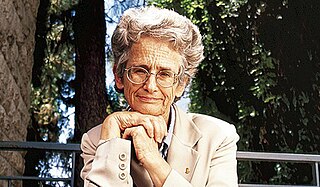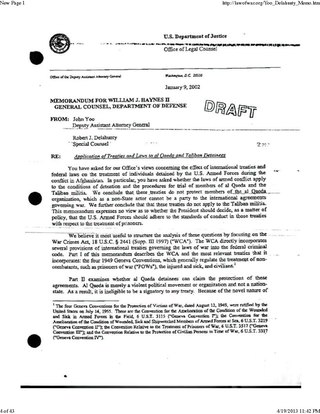Related Research Articles
Universal jurisdiction is a legal principle that allows states or international organizations to claim criminal jurisdiction over an accused person regardless of where the alleged crime was committed, and regardless of the accused's nationality, country of residence, or any other relation to the prosecuting entity. Crimes prosecuted under universal jurisdiction are considered crimes against all, too serious to tolerate jurisdictional arbitrage. The concept of universal jurisdiction is therefore closely linked to the idea that some international norms are erga omnes, or owed to the entire world community, as well as to the concept of jus cogens – that certain international law obligations are binding on all states.

The War Crimes Act of 1996 is a law that defines a war crime to include a "grave breach of the Geneva Conventions", specifically noting that "grave breach" should have the meaning defined in any convention to which the United States is a party. The definition of "grave breach" in some of the Geneva Conventions have text that extend additional protections, but all the Conventions share the following text in common: "... committed against persons or property protected by the Convention: willful killing, torture or inhuman treatment, including biological experiments, willfully causing great suffering or serious injury to body or health."

John Choon Yoo is a Korean-born American legal scholar and former government official who serves as the Emanuel S. Heller Professor of Law at the University of California, Berkeley. Yoo became known for his legal opinions concerning executive power, warrantless wiretapping, and the Geneva Conventions while serving in the George W. Bush administration, during which he was the author of the controversial "Torture Memos" in the War on Terror.
Francis Anthony Boyle is a human rights lawyer and professor of international law at the University of Illinois College of Law. He has served as counsel for Bosnia and Herzegovina and has supported the rights of Palestinians and indigenous peoples.

Charles Anthony Fried is an American jurist and lawyer. He served as United States Solicitor General under President Ronald Reagan from 1985 to 1989. He is a professor at Harvard Law School and has been a visiting professor at Columbia Law School. He also serves on the board of the nonpartisan group, the Campaign Legal Center.
Extrajudicial prisoners of the United States, in the context of the early twenty-first century War on Terrorism, refers to foreign nationals the United States detains outside of the legal process required within United States legal jurisdiction. In this context, the U.S. government is maintaining torture centers, called black sites, operated by both known and secret intelligence agencies. Such black sites were later confirmed by reports from journalists, investigations, and from men who had been imprisoned and tortured there, and later released after being tortured until the CIA was comfortable they had done nothing wrong, and had nothing to hide.

Jay Scott Bybee is an American lawyer and jurist serving as a senior U.S. circuit judge of the Court of Appeals for the Ninth Circuit. He has published numerous articles in law journals and has taught as a senior fellow in constitutional law at William S. Boyd School of Law. His primary research interests are in constitutional and administrative law.

Philippe Joseph Sands, KC is a British and French writer and lawyer at 11 King's Bench Walk and Professor of Laws and Director of the Centre on International Courts and Tribunals at University College London. A specialist in international law, he appears as counsel and advocate before many international courts and tribunals, including the International Court of Justice, the International Tribunal for the Law of the Sea, the European Court of Justice, the European Court of Human Rights and the International Criminal Court.

In the practice of international law, Command responsibility is the legal doctrine of hierarchical accountability for war crimes, whereby a commanding officer (military) and a superior officer (civil) is legally responsible for the war crimes and the crimes against humanity committed by his subordinates; thus, a commanding officer always is accountable for the acts of commission and the acts of omission of his soldiers.
The Guantanamo Bay detention camp is a United States military prison within Guantanamo Bay Naval Base, also referred to as Gitmo, on the coast of Guantánamo Bay in Cuba. Of the 780 people detained there since January 2002 when the military prison first opened after the September 11 attacks, 741 have been transferred elsewhere, 30 remain there, and 9 have died while in custody.
Majid Shoukat Khan is a Pakistani who was the only known legal resident of the United States held in the Guantanamo Bay Detainment Camp. He was a "high value detainee" subject to “enhanced interrogation” by the U.S. intelligence forces.

Ruth Gavison was an Israeli expert of human rights, professor of law at the Hebrew University of Jerusalem, and recipient of the Israel Prize.
"Enhanced interrogation techniques" or "enhanced interrogation" was a program of systematic torture of detainees by the Central Intelligence Agency (CIA), the Defense Intelligence Agency (DIA) and various components of the U.S. Armed Forces at remote sites around the world—including Bagram, Guantanamo Bay, Abu Ghraib, and Bucharest—authorized by officials of the George W. Bush administration. Methods used included beating, binding in contorted stress positions, hooding, subjection to deafening noise, sleep disruption, sleep deprivation to the point of hallucination, deprivation of food, drink, and medical care for wounds, as well as waterboarding, walling, sexual humiliation, rape, sexual assault, subjection to extreme heat or extreme cold, and confinement in small coffin-like boxes. A Guantanamo inmate's drawings of some of these tortures, to which he himself was subjected, were published in The New York Times. Some of these techniques fall under the category known as "white torture". Several detainees endured medically unnecessary "rectal rehydration", "rectal fluid resuscitation", and "rectal feeding". In addition to brutalizing detainees, there were threats to their families such as threats to harm children, and threats to sexually abuse or to cut the throat of detainees' mothers.
In United States law, habeas corpus is a recourse challenging the reasons or conditions of a person's detention under color of law. The Guantanamo Bay detention camp is a United States military prison located within Guantanamo Bay Naval Base. A persistent standard of indefinite detention without trial and incidents of torture led the operations of the Guantanamo Bay detention camp to be challenged internationally as an affront to international human rights, and challenged domestically as a violation of the Due Process Clause of the Fifth and Fourteenth amendments of the United States Constitution, including the right of petition for habeas corpus. In 19 February 2002, Guantanamo detainees petitioned in federal court for a writ of habeas corpus to review the legality of their detention.
Barbara Olshansky is an American human rights lawyer.
Robert J. Delahunty is an American attorney, legal scholar, and former general counsel. He is a professor at the University of St. Thomas School of Law in Minneapolis, Minnesota. From 1989 to 2003, he worked in the Office of Legal Counsel. During his tenure there, he cowrote several legal opinions with John Yoo relating to interrogation, detention, and rendition of terror suspects.

Jameel Jaffer is a human rights and civil liberties attorney and the inaugural director of the Knight First Amendment Institute at Columbia University, which was created to defend the freedoms of speech and the press in the digital age. The Institute engages in "strategic litigation, research, and public education." Among the Knight Institute's first lawsuits was a successful constitutional challenge to President Trump's practice of blocking critics from his Twitter account.

A set of legal memoranda known as the "Torture Memos" were drafted by John Yoo as Deputy Assistant Attorney General of the United States and signed in August 2002 by Assistant Attorney General Jay S. Bybee, head of the Office of Legal Counsel of the United States Department of Justice. They advised the Central Intelligence Agency, the United States Department of Defense, and the President on the use of enhanced interrogation techniques—mental and physical torment and coercion such as prolonged sleep deprivation, binding in stress positions, and waterboarding—and stated that such acts, widely regarded as torture, might be legally permissible under an expansive interpretation of presidential authority during the "War on Terror".
The Detainee Treatment Act of 2005 (DTA) is an Act of the United States Congress that was signed into law by President George W. Bush on 30 December 2005. Offered as an amendment to a supplemental defense spending bill, it contains provisions relating to treatment of persons in custody of the Department of Defense, and administration of detainees held in Guantanamo Bay, Cuba, including:
David Kretzmer is an Israeli expert in international and constitutional law. He is professor emeritus of international law of the Hebrew University in Jerusalem and professor of law at the Transitional Justice Institute at the University of Ulster in Northern Ireland. He has been a member of international and Israeli Human Rights organizations, including the UN Human Rights Committee under the International Covenant on Civil and Political Rights, serving as its vice-chairperson in 2001 and 2002. He established the Centre for Human Rights at the Hebrew University of Jerusalem and was a founding member of the Association for Civil Rights in Israel, the Minerva Centre for Human Rights, a joint centre of the Hebrew University and Tel Aviv University. He is also a founding member of B'Tselem.
References
- ↑ James Friedman: official biography Archived 2006-11-21 at the Wayback Machine , Maine School of Law
- ↑ jurist.law.pitt.edu
- ↑ JURIST, 8/1/11